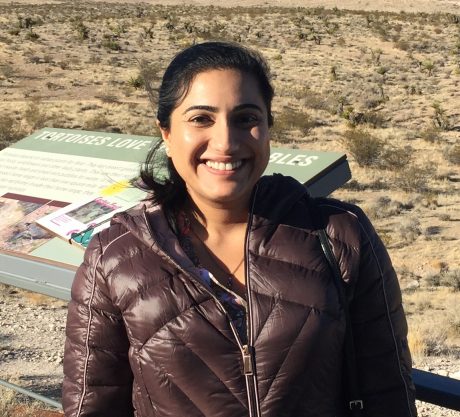Vandna Bindra ’18PHD: “I Hope to. . .Conduct Innovative Research that has Practical Applications for Educators and Students”
As a high school English teacher, Vandna Bindra ’18PHD discovered her own commitment to lifelong learning as she helped her students flourish in the classroom. Now as she’s set to graduate with her doctoral degree, she hopes to link research to practice to build curricula and mentorship programs that promote positive identity and moral development for educators and students alike.
Hometown: Raleigh, North Carolina
Field of Study: Ph.D. – Educational Psychology
My research focuses on. . . the moral identity of emerging adults in relation to social media use, race in online contexts, the impact of sociocultural factors on adolescents’ motivation to pursue STEM careers, as well as socioemotional development and resilience of adolescents.
For the Next Phase of My Career. . . I would like to be an assistant professor of educational psychology, teaching undergraduate and graduate students, conducting research on the developmental impact of technology on adolescents and emerging adults, and promoting racial literacy in schools.
I chose education. . . because stepping into the classroom and developing meaningful relationships with students allowed me to discover my true passion and purpose in life. I began my career in education as a high school English teacher, following in the footsteps of my mentors, who were phenomenal middle school and high school English teachers. Through my teaching, I hope to help my students develop a commitment to lifelong learning, social responsibility, and civic engagement.
After graduation. . . I hope to use the research skills, theoretical frameworks (particularly Critical Race Theory) and developmental/educational psychology principles I learned during the course of my doctoral studies at NC State to conduct innovative research that has practical applications for educators and students. This will, hopefully, include applying findings from research studies to creating and implementing curriculum as well as mentorship programs that promote positive identity and moral development.
My research. . . had a powerful impact on me during my doctoral program. While my topic was already timely when I began the program, it became even more relevant given the changing political and social climate over the past couple years. I came to understand just how important it was to research this topic and to convey the perspectives and emotional responses of students to the topic – they shared with me that racial literacy is something that is lacking in schools – in fact, most teachers and schools shy away from discussing race, particularly in the context of social media. I like to think I’m making a difference through my research. It has certainly molded me into the person I am today.
One course that impacted. . .my perspective and trajectory as an educator more than any other was Critical Race Theory in Education with Dr. DeCuir-Gunby. This course finally gave me a vocabulary to discuss and analyze race and its impact on the educational system in the United States., including experiences I have personally been through as a student and as a teacher, and for that, I am forever grateful.
To others considering an advanced degree in the field of education, I would. . .pass on some of the best advice I received. As I was starting my doctoral program, my advisor Dr. DeCuir-Gunby instructed me to “pick a topic that you are passionate about and want to pursue for the course of your program (and potentially after graduation), then try to tailor your papers for each course to that topic in some way, exploring it from various angles. By the time you enter the dissertation phase, you already have a plethora of articles and papers you have written on the topic to draw from.”
The other piece of advice would be to remember that you are the expert on your topic, especially if you are researching a topic that has not been tackled much or at all before; however, you should also remember that there is always research literature out there to which you can (and must) refer, whether it is directly related to your topic or tangentially related.
Lastly, if you are planning on conducting research with students in the public school system, be aware that there are multiple layers to obtaining approval to conduct your research, and you may not be able to obtain approval in time or at all, especially if you are researching a sensitive topic – it is wise to always have a backup plan.
- Categories:



